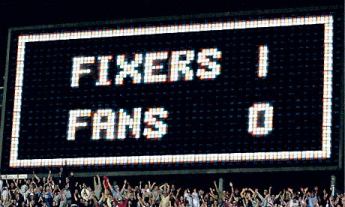A Passive Response To The Match Fixers Threatens Fair Play
Internet gambling makes it easier for punters to bet on any event.
If you are a criminal looking for a moneymaking scheme, an easy option today is sports gambling. The betting market is vast, global, liquid and pretty anonymous. You simply pay off a few athletes or referees, perhaps threaten them with blackmail or violence, and then put your money on the agreed result. Whereas smuggling drugs or people can get you shot or jailed, match-fixing almost never does. It is also a handy way to launder money.
This week’s claims of rampant match-fixing in tennis are therefore unsurprising. Tennis is especially easy to corrupt because a fixer only needs to bribe one player, whose life is an endless grind of matches anyway. The player need not even agree to lose: throwing a game or a set can be enough, given the modern practice of live in-play betting.
The allegations by the BBC and the news website BuzzFeed involve 16 players who have ranked in the top 50 over the past decade, eight of whom were in the draw for the current Australian Open. None has been sanctioned by the tennis authorities. The issue transcends tennis, however. Match-fixing has quietly grown into probably the biggest threat facing sport.
Criminals have been fixing sporting events since ancient Greece, says Declan Hill, author of The Fix: Soccer and Organized Crime. Match-fixing took off with the internet, which made it easier for punters to bet on any match anywhere.
The relatively small and regulated pre-internet world of sports gambling has become “a jungle with no borders, populated by tens of thousands of operators”, write Christian Kalb and Pim Verschuuren of the Iris think-tank in Paris.
In fact, sports gambling is now a bigger business than sport itself. The industry’s estimated value — counting both legal and illegal gambling — is “anywhere between $700bn and $1tn a year”, Darren Small, director of integrity at Sportradar, the betting and sports data analysts, told the BBC in 2013.
For comparison, the combined revenues of Europe’s top-division football clubs in 2014 were below €16bn, says the European football authority Uefa. All other sports turn over less than football. In short, gamblers can afford to fix athletes.
The fixers include Chinese, Italian and eastern European crime syndicates. There are also small mom-and-pop operations and even football clubs who fix their own results so as to balance their budgets through gambling.
The easiest athletes to fix are those who earn nothing (such as the many footballers in small national leagues whose wages are routinely paid late) or almost nothing (many tennis players barely make enough to pay for their travel).
Even well-paid athletes can be bought. They tend to have short careers, often mismanage their finances (sometimes because of gambling habits) and can be blackmailed or threatened with violence. Consequently, fixing afflicts some prominent competitions.
The top divisions of German and Italian football have experienced match-fixing scandals this century; the BBC-BuzzFeed allegations include fixing at Wimbledon, and even football’s World Cup may not be immune — Mr Hill’s book provides strong evidence of a fixed match at a recent tournament.
In addition, two referees at the 2002 World Cup, the Chinese Lu Jun and the Ecuadorean Byron Moreno, were jailed years later — Mr Lu for match-fixing and Mr Moreno for landing in New York in 2010 with six kilos of heroin concealed in his underpants.
Fixes are very rarely revealed. All participants in a fix benefit from it and have no incentive to blab for fear of the law or vengeful match-fixers. Often the only victim is the sport itself, and it may not even know it has been a victim. Media rarely touch the subject, afraid of either violence or libel laws. The police usually have other priorities.
Most sporting authorities have been passive too. They tend to worry more about scandals than about problems, says Sylvia Schenk of Transparency International, and because match-fixing is rarely uncovered it rarely produces scandals. Few sports bodies employ enough staff to combat match-fixing. The Tennis Integrity Unit, for instance, has just five or six investigators to cover 120,000 matches played worldwide each year.
Moreover, sporting authorities are rarely models of competence and rigour, as shown by the scandals that have engulfed Fifa, professional cycling and international athletics. Tennis’s authorities responded to the match-fixing allegations by playing them down at a press conference that they terminated within ten minutes.
Football spectators will not watch matches that they suspect are rigged. Whole sports risk experiencing something similar
Often, as in tennis now, evidence of match-fixing comes from suspicious betting patterns: typically a sudden surge of money placed on a particular result.
However, such patterns alone are seldom enough even to prompt a police investigation. Hard evidence is needed but usually cannot be obtained without intricate international co-operation. A western European policeman whose brief is to guard against match-fixing in his country says he has neither the budget nor the contacts to travel to China to investigate a case.
Sports wonks have long debated how to fight fixing. Some favour creating an international body to tackle the problem, modeled on the occasionally effective World Anti-Doping Agency. However, nothing along those lines is in the works. Some sport authorities have created anonymous hotlines for whistleblowers to report match-fixing but it continues almost unchecked.
More than doping or hooliganism, match-fixing has the potential to destroy sport. Football leagues from eastern Europe to China to Southeast Asia have lost spectators who will not watch matches that they suspect are rigged. Whole sports risk experiencing something similar.
As the British author Nick Hornby warned in the Financial Times in 1994 after a bribery scandal in English football: “Once we begin to doubt that what we are seeing is real, then we will cease to care and, without the caring, it is all over.”
Article Written By: Simon Kuper
0


